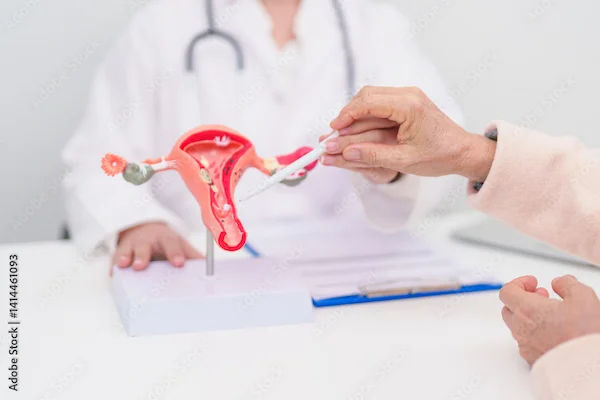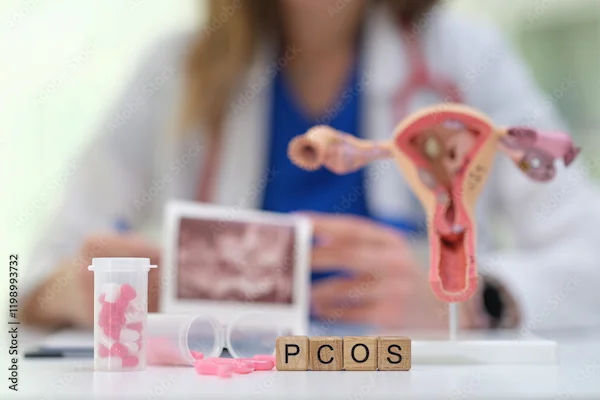Insights on PCOD and Pregnancy
Know about the insights of pcod and pregnancy, symptoms of pcod and how to improve fertility during pcod. Learn about the pregnancy care in pcod.

Written by Dr. Dhankecha Mayank Dineshbhai
Reviewed by Dr. M L Ezhilarasan MBBS
Last updated on 14th Aug, 2025

Introduction
PCOD (Polycystic Ovarian Disease) is a common hormonal disorder affecting many women, especially during their reproductive years. If you have PCOD and are planning for pregnancy, you may have concerns about fertility and managing your health.
In this article, you will find valuable insights on how PCOD impacts pregnancy and what steps you can take to improve your chances of a healthy conception and delivery.
Understanding PCOD and Its Effects on Pregnancy
PCOD occurs when a woman’s ovaries produce higher-than-normal levels of male hormones (androgens), leading to irregular periods, cysts in the ovaries, and difficulties in ovulation. These hormonal imbalances can make it harder to conceive naturally.
How PCOD Affects Pregnancy?
It includes:
- Irregular Ovulation – Many women with PCOD do not ovulate regularly, making it difficult to predict fertile days.
- Higher Risk of Miscarriage – Hormonal imbalances may increase the risk of early pregnancy loss.
- Gestational Diabetes – PCOD raises the risk of developing diabetes during pregnancy.
- High Blood Pressure & Preterm Birth – Women with PCOD are more likely to have pregnancy-induced hypertension or deliver early.
Consult a Gynaecologist for Personalised Advice
Symptoms of PCOD to Watch For
If you have PCOD, you may experience:
- Irregular or missed periods
- Heavy or prolonged menstrual bleeding
- Excess facial or body hair (hirsutism)
- Acne and oily skin
- Weight gain, especially around the waist
- Hair thinning or male-pattern baldness
If you notice these symptoms, consult a doctor for proper diagnosis and guidance.
How to Improve Fertility with PCOD?
While PCOD can make conception challenging, many women successfully conceive with lifestyle changes and medical support. Here’s what you can do:
1. Maintain a Healthy Weight
- Weight management is crucial because excess fat worsens insulin resistance, a key factor in PCOD. Even a 5-10% weight loss can help regulate periods and improve ovulation.
2. Follow a Balanced Diet
- Low Glycemic Index (GI) Foods – Choose whole grains, lentils, and vegetables over refined carbs.
- High Protein Intake – Include eggs, lean meats, fish, and plant-based proteins like beans.
- Healthy Fats – Avocados, nuts, and olive oil help balance hormones.
- Avoid Sugary & Processed Foods – They spike insulin levels, worsening PCOD symptoms.
3. Exercise Regularly
- Moderate exercise (like walking, yoga, or swimming) for 30 minutes daily helps regulate hormones and improve fertility.
4. Manage Stress
- Stress worsens hormonal imbalances. Try relaxation techniques like meditation, deep breathing, or hobbies that calm your mind.
5. Medical Treatments
If lifestyle changes aren’t enough, your doctor may recommend:
- Ovulation Induction Drugs (Clomiphene or Letrozole) to stimulate egg release.
- Metformin to improve insulin sensitivity.
- Fertility Treatments like IUI (Intrauterine Insemination) or IVF (In Vitro Fertilisation), if needed.
Pregnancy Care for Women with PCOD
Once pregnant, extra care is needed to ensure a healthy pregnancy:
- Regular Prenatal Check-ups – Monitor blood sugar, blood pressure, and fetal growth.
- Healthy Diet & Light Exercise – Helps control weight and reduces complications.
- Monitor for Gestational Diabetes – Get tested between 24-28 weeks.
- Stay Hydrated & Rest Well – Prevents fatigue and supports baby’s development.
When to See a Doctor?
If you have PCOD and are struggling with:
- Irregular periods for over 3 months
- Difficulty conceiving after 6-12 months of trying
- Severe acne, hair loss, or excessive hair growth
- Signs of diabetes (increased thirst, frequent urination)
Consult a specialist for personalised treatment.
Final Thoughts
PCOD doesn’t mean you can’t have a healthy pregnancy. With the right lifestyle changes, medical guidance, and a positive approach, many women with PCOD conceive and deliver healthy babies. If you’re planning for pregnancy, start with small, sustainable changes and seek expert advice when needed.
Consult a Gynaecologist for Personalised Advice
Consult a Gynaecologist for Personalised Advice

Dr. Rupam Manna
Radiation Specialist Oncologist
4 Years • MBBS MD(RADIO THERAPY)
Barasat
Diab-Eat-Ease, Barasat

Dr. Sreeparna Roy
Obstetrician and Gynaecologist
8 Years • MBBS , MS (OBSTETRICS & GYNAECOLOGY), Fellowship in Infertility, Endoscopy & Ultrasonography), Fellowship in Laparoscopy & Hysteroscopy,DRM
Kolkata
Dr Utsa Basu Clinic, Kolkata

Dr Bhawna Garg
Gynaecological Oncologist
26 Years • MBBS, MS, (PGI MS ROHTAK) FELLOWSHIP GYNECOLOGY ONCOLOGY, (CANCER INSTITUTE CHENNAI)
Delhi
Apollo Hospitals Indraprastha, Delhi

Dr. Renuka Chandran
Obstetrician and Gynaecologist
30 Years • MBBS, MD, DGO, Masters in Advanced Ultrasound in Obs & Gynea
Bangalore
Apollo Clinic Bellandur, Bangalore

Dr. Revathi S Rajan
Obstetrician and Gynaecologist
24 Years • MBBS, DGO, DNB.FFMM
Bengaluru
Apollo Clinic, JP nagar, Bengaluru
Consult a Gynaecologist for Personalised Advice

Dr. Rupam Manna
Radiation Specialist Oncologist
4 Years • MBBS MD(RADIO THERAPY)
Barasat
Diab-Eat-Ease, Barasat

Dr. Sreeparna Roy
Obstetrician and Gynaecologist
8 Years • MBBS , MS (OBSTETRICS & GYNAECOLOGY), Fellowship in Infertility, Endoscopy & Ultrasonography), Fellowship in Laparoscopy & Hysteroscopy,DRM
Kolkata
Dr Utsa Basu Clinic, Kolkata

Dr Bhawna Garg
Gynaecological Oncologist
26 Years • MBBS, MS, (PGI MS ROHTAK) FELLOWSHIP GYNECOLOGY ONCOLOGY, (CANCER INSTITUTE CHENNAI)
Delhi
Apollo Hospitals Indraprastha, Delhi

Dr. Renuka Chandran
Obstetrician and Gynaecologist
30 Years • MBBS, MD, DGO, Masters in Advanced Ultrasound in Obs & Gynea
Bangalore
Apollo Clinic Bellandur, Bangalore

Dr. Revathi S Rajan
Obstetrician and Gynaecologist
24 Years • MBBS, DGO, DNB.FFMM
Bengaluru
Apollo Clinic, JP nagar, Bengaluru




